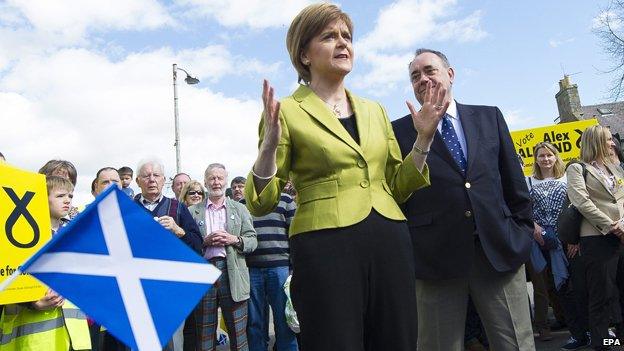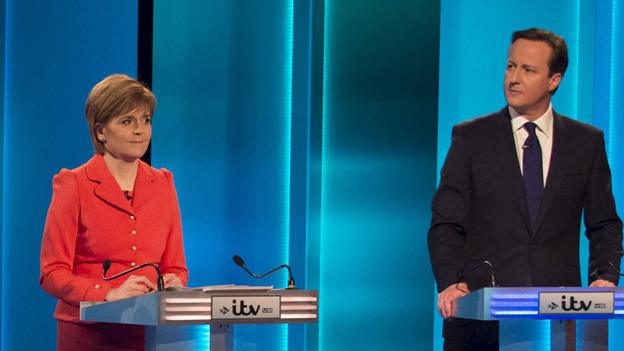Why SNP matters to whole of UK
- Published
- comments

John Swinney, the SNP's deputy First Minister of Scotland, told the Today programme this morning that the heart of its manifesto - due out later today - would be to end austerity in the UK as a whole, and would support Labour to bring that about.
This may sound great for Labour and Ed Miliband. But it is in fact pretty much his worst nightmare.
How so?
Well, Labour last week put at the heart of its manifesto that if elected it would get the government's deficit and debt down in the course of the next parliament, and to that end there would be cuts in non-protected public services (or everything but schools, health and overseas aid).
It did that partly because all its polling showed that in England it would need to demonstrate what it thinks of as "fiscal credibility" to get a hearing from undecided voters.
So it is quite definitely not an act of amity and solidarity with its putative Labour brothers for the SNP, led by Nicola Sturgeon, to tell voters that she'll get the Tories out, get Labour in and make sure Labour won't stick to its fiscal promises.
The great fear for Labour is that its recent progress in England will be derailed, while its collapsing vote in Scotland remains shattered.
Which if you are a Tory, you may think is great. And in fact the Tories are currently shouting from the rooftops about Labour being bossed by the SNP.
But the Conservatives could yet live to regret the consequence of campaigning on the supposed poisonous embrace offered by Sturgeon to Miliband - because it brings the risk for the UK of constitutional and economic crisis.
How so?
Well, the Tories may hope that by alleging a Labour government would be backseat-driven from Edinburgh they'll persuade enough floating voters to switch to them, and secure an overall majority.

Could a Conservative/SNP partnership happen?
However all the opinions currently demonstrate that's profoundly unlikely - it would require a shift of votes late in a campaign on a scale for which I can find no modern precedent.
A far more plausible outcome is that the Tories end up with a few more seats than Labour, on the back of a slightly bigger share of the vote - and would therefore have first dibs on trying to form a government, under our constitutional convention.
But if the SNP end up getting the number of seats that currently looks likely - not a million miles from 50 - and the Liberal Democrats slump to less than 30 (which also looks likely, right now), it may be impossible for the Tories to form either a workable coalition or an effective minority government on the so-called confidence-and-supply basis (whereby it would secure the backing of smaller parties for measures crucial to its ability to govern).
At that point, Labour would presumably have its chance to form a government. But it has ruled out a formal coalition with the SNP. And it is very difficult to see how it could form any kind of more loose partnership with the SNP which would not look profoundly undemocratic to many English citizens, insulting to its residual loyalists in Scotland and therefore lethal to its long-term reputation.
Could Labour form a credible government if it had fewer seats and fewer votes than the Tories, and having spent its campaign repudiating the advances of the SNP? That seems implausible.
Out of this mess, perhaps a very odd and paradoxical alliance could be forged, as Robert Harris mused in yesterday's Sunday Times, between a Tory party recognising that union with Scotland no longer serves its own existential interests and an SNP whose priority is to secure constitutional independence from the rest of the UK coupled with a continued monetary union.
As Harris pointed out, alliances as strange have been forged in our parliamentary history - and the logic of securing power can trump ideological and emotional differences.
More likely however is that the UK would need another general election in short order.
Which all sounds a bit inconvenient, but from an economic perspective could be a bit worse than that. Business leaders tell me they would expect an investment hiatus by companies during the unstable interregnum, bankers tell me overseas investors would shun the UK and city traders anticipate a sharp and destabilising fall in the pound; .
It would be the equivalent of a big chill hitting Britain, that temporarily undermines economic activity.
So because of the way that Scotland's resources are determined by the UK's budget, via the block-grant arrangements, it may be completely reasonable for the SNP to campaign in this election to end austerity for the whole of the UK.
But the consequences of its decision to exercise that logic are unpredictable.